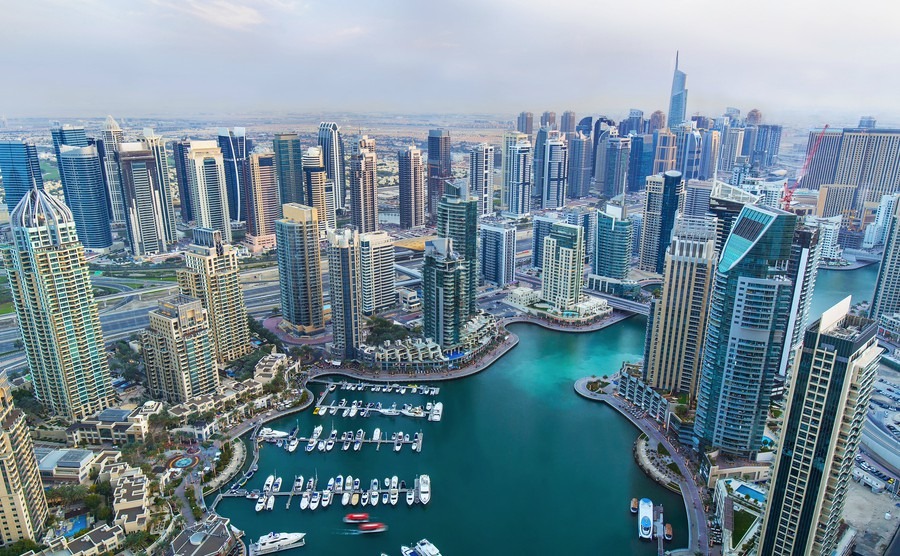Dubai is home to nearly a quarter of a million lucky British expats, who benefit from high wages, a high standard of living and tax breaks.
Dubai is a popular expat location with around 250,000 UK citizens calling the largest city in the United Arab Emirates (UAE) home – of the 2.5 million people living in Dubai, nearly 85% are expat and migrant workers. Attracted by the tax-free wealth and luxury living, Dubai provides expats from around the world with a great opportunity to live, work and experience an exciting and thriving culture.
Its reputation for having a high cost of living is mitigated by the generous salaries on offer. This wealth ensures the provision of state of the art health, transportation and educational facilities. Dubai is an Islamic city-state, but is the most liberal of all the Emirates, and all religions are accepted.
Dubai is one of the only regions in the Middle East where foreigners can acquire real estate.
Cost of living
The average expat salary in Dubai is around £8,000 per month, and considering these paycheques are tax free, that’s a lot of spare change to invest in the bling that Dubai is famous for. It’s not uncommon for expats working in Dubai to enjoy additional luxuries such as domestic help, childcare and drivers. Although income tax is not charged, a standard tipping amount of 10% is customary, with many restaurants and hotels charging a tax on their services. It is possible to dine out on a variety of budgets, however. Public transportation is relatively inexpensive. Whereas housing is considered costly, but of a high standard and well within the means of an average Dubai salary.
Buying or renting
Dubai is one of the only regions in the Middle East where foreigners can acquire real estate. For this reason, Dubai attracts a huge amount of foreign property investment. From the glitzy shores of Palm Jumeria, to more affordable areas like Mirdif, there are different options to suit most budgets. Purchasing a two-bedroom apartment in Dubai can range anywhere from 20.5 million AED (£4.3 million) to 240,000 AED (£50,000). The Dubai property market contains everything from simple serviced flats to palace like villas with gold faucets. Many expats choose to rent when they arrive. Often a one-year lease is required (and must be paid in advance), though shorter-term accommodation can be found. Typical monthly rent for a two-bedroom flat is £3,000 per month.

Live the highlife in Dubai
Working in Dubai
Dubai is considered an excellent place to work and do business. Thanks to its tax-free status, proximal location and highly-skilled workforce there are plenty of opportunities. The UAE was ranked as the 26th-easiest country in the world for doing business, in the World Bank’s 2017 Ease of Doing Business survey, and listed as one of the world’s most improved economies for doing business, having surged into the top 30 for the first time. It was ranked first place for paying taxes, and also ranked well for dealing with construction permits and protecting investors.
Expats require a residency visa to work in Dubai. Once you have acquired a residency visa you can obtain a work permit. Most expats that come to Dubai do so with a job offer in place. In these circumstances, the employer arranges the residency visa and work permit. Business is quite formal in Dubai, with business hours typically taking place Sunday to Thursday between 9:00am –5:00pm.
The UAE was ranked as the 26th-easiest country in the world for doing business
Healthcare, schools and safety
The downside of paying low taxes in Dubai is the government provides very few public services. While government funded services do exist, most expats find they will pay a lot for services such as medical and hospital care, as well as education. The upside is the standards are very high. Expats are encouraged to have an extensive medical insurance policy in place. This is often covered by the sponsoring company, with policies costing an average of around £2,000 a year. For those looking to educate their children in Dubai there are over 150 private schools to choose from, many that support curriculums of specific countries.
The UAE is second the safest country in the world, according to the World Economic Forum’s 20 safest countries list with only the odd petty crimes to report.
With plenty of work opportunities, a high standard of living and the potential for home ownership as a non-resident, there are plenty of reasons to choose Dubai as a place to live and work.

